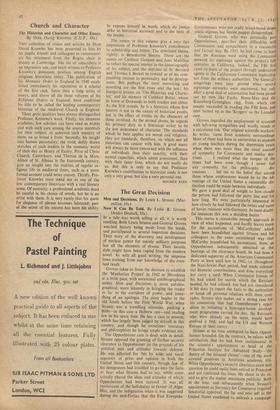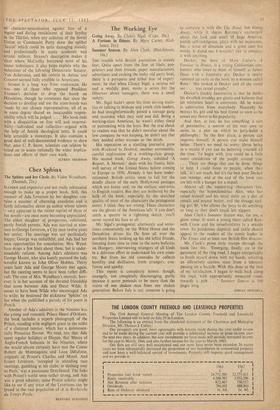The Great Decision
Now It Can Be Told. By Leslie R. Groves. (Andre Deutsch, 35s.)
IF a tale was worth telling at all, it is worth retelling. Both Lewis Strauss and General Groves watched history being made from the inside, and partiCipated in several important decisions.
Their story of the discovery and development of nuclear power for mainly military purposes has all the elements of drama. Their laconic style might have been copied from the modern novel. As with all good writing, the suspense loses nothing from our knowledge of the even- tual result.
Groves takes us from the decision to establish the 'Manhattan Project' in 1942 to Hiroshima at a brisk pace, with occasional autobiographical asides. Men and Decisions is more autobio- graphical, more leisurely in bringing the reader as far as the corridors of power, and some- thing of an apologia. The story begins in the old South before the First World War, when Strauss was a travelling salesman, packing a Bible—in this case a Hebrew one—and reading Jaw in his spare time. He has a case to present,
• which has largely been judged by default in this country, and though he sometimes moralises and philosophises he brings ample evidence too.
The Oppenheimer case is dealt with in detail. Strauss opposed the granting of further security clearance to Oppenheimer on the grounds of his political past and attitudes towards defence. He was pilloried for this by wide and vocal segments of press and opinion in both the United States and this country, though few of his denigrators had troubled to go into the facts or hear what Strauss had to say, while some actually shared the ideas and attitudes of which Oppenheimer had been accused. It was all reminiscent of the hullabaloo in favour of Alger Hiss, and the indignation when it was suggested during the mid-Forties that the East European Governments were not really broad-based deino. cratic regimes but Soviet puppet dictatorships.
General Groves, who was personally pro' Oppenheimer, describes their difficulties with Communists and sympathisers in a reasonable and factual way. By 1943, he had come to learn that the Russians were using the Communist network for espionage against the project's lab' oratories in California. Indeed, the FBI first came to learn of the project through undercovet agents in the Californian, Communist leadership, not from the military authorities. The General's misgivings were later proved when several espionage networks were uncovered, but onlY after a good deal of information had been passed out by men like Fuchs, Nunn-May and the Rosenberg-Greenglass ring, from which one couple succeeded in evading the FBI hunt, and later turned up as the `Krogers' in the Lonsdale case.
Groves regarded the employment of scientists with left-wing sympathies and woolly minds as, a calculated risk. 'Our original scientific workers,' he writes, 'came from academic surroundings. Most of them had been in universities as students or young teachers during the depression years, when there was more than the usual amount of sympathy for Communist and similar doc- trines. . . . I realised what the temper of the times had been even though I never had any sympathy for the philosophy . . dis- cussions . . . led me to the belief that among those whose employment would be to the ad- vantage of the United States a reasonable dis- tinction could be made between individuals. . . • We gave a good deal of weight to how closely the pason had followed the party line and for how long. We were particularly interested in how closely he had followed the twists and turns of Soviet relations with Germany. In most doubt- ful instances this was a deciding factor.'
This seems a reasonable enough approach in view of what happened, and hardly leaves room for the accusations of 'McCarthyism' which have been brandished against Strauss and his colleagues in the same uninhibited way that McCarthy brandished his accusations. Now, as Oppenheimer subsequently admitted at the hearings of the clearance board, he had been a dedicated supporter of the American Communist Party at least until late in 1942, i.e. throughout the Nazi-Soviet Pact period, had made substan- tial financial contributions, and done everything but carry a card. When Communist friends of his had asked for secrets which the Russians needed, he had refused, but had not considered it his duty to report the facts to the authorities or break off personal relations with these com- rades. Strauss also makes out a strong case for his contention that had Oppenheimer's oppo- sition to initiating a hydrogen-bomb develop- ment programme carried the day, the Russians, who were already on the scent, would have evolved it first, and had the US and Western Europe at their mercy.
Strauss at no time attempted to have Oppen- heimer hounded. On the contrary, he relates with satisfaction that he had been instrumental in the scientist's appointment as head of the Princeton Institute for Advanced Study—`the theory of the leisured classes'—one of the most coveted positions in American academic life. When Oppenheimer's security clearance came into question he could easily have retired to Princeton and not contested the issue. He chose to do so, and to give the matter maximum publicity. Both at the time, and subsequently when Strauss's appointment as Secretary for Commerce required Senatorial approval, the far and near left in the United States combined to unleash a campaign of character-assassination against him of a vigour and daring reminiscent of their heyday in the Thirties, when any criticism of the Soviet Union or Communist Party drew the epithet 'fascist' which could be quite damaging socially and professionally in many academic and artistic milieux. Strauss's description makes it clear where McCarthy borrowed most of his smear techniques; it also helps explain why the behaviour of the left-wing Democratic Senator, Van Ackerman, and his coterie in Advise and Consent seemed fully credible to Americans.
Strauss is a long way from conformist. He was one of those who opposed President Truman's decision to drop the bomb on Hiroshima, though he comments that since the decision to develop and use the atom-bomb was 'made by our chosen representatives, all of us in some degree shared an inescapable respon- sibility which will be judged. . . His book ends with a disquisition on free will and responsi- bility— individual and collective—argued with the help of Jewish theological texts. It could help scramble a stereotype. It also contains a good deal of well-documented evidence to show that, pace C. P. Snow, scientists can seldom be relied on to assess rationally the wider implica- tions and effects of their own work.
ALFRED SHULMAN



































 Previous page
Previous page